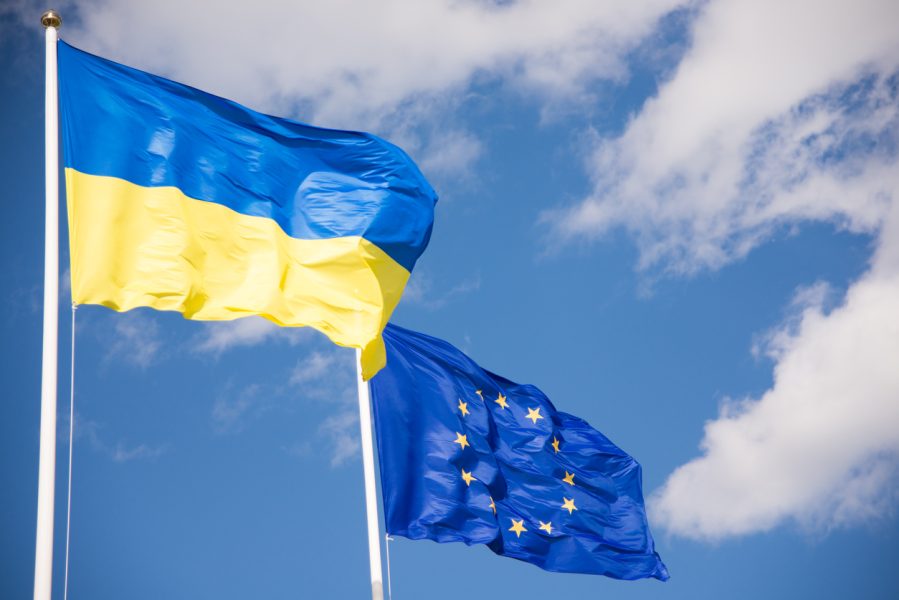
Explained: What EU candidature means for war-torn Ukraine
Though making Ukraine a candidate for EU membership is a step forward, it will have no immediate effect on its war with Russia as matching the rigorous conditions to join the bloc can take years

Four days after Russia’s “special military operation” started on February 24, Ukraine signed an official request to join the European Union – a move that Russia had long reviled. On June 24, the European Commission recommended that Ukraine should be granted European Union candidate status.
The leaders of France, Germany, Italy and Romania visited Kyiv on Thursday and backed Ukraine’s EU membership, starting with the candidate state status.
But all 27 EU countries need to agree to grant Ukraine candidate status, which will be discussed during the ongoing EU leaders’ summit. But even if candidacy is green-lit, working towards full membership status can take years or even decades.
Also read: BRICS supports Russia-Ukraine talks at 14th Summit
Making Ukraine a candidate for European Union membership will have no immediate effect on its war with Russia, and merely starts an uncertain process toward accession. Turkey has been a candidate since 1999 and North Macedonia since 2005, and both have yet to join the bloc. In a system that works by consensus, any nation effectively has a veto over new members.
A long way to membership
Matching the EU’s rigorous conditions to join the bloc can take years, especially for a country in a state of war. Demands range from creating a competitive market economy to guaranteeing democratic rule.
Joining the membership is an individual process on a case-by-case basis where each country has to fulfil set requirements. It might take years for Ukraine to restore and improve the work of institutions in Ukraine, and then win the approval of all EU countries.
It has been almost a decade since a country went from a candidate to a member, with the last nation being Croatia in 2013.
European leaders have used Ukraine’s EU membership to show their solidarity and both “don’t necessarily have to be the exact same thing”, Will Daniel, assistant professor in comparative politics at the University of Nottingham in the United Kingdom, told Al Jazeera.
If the candidacy for membership is approved, many question how it will affect EU funding to Ukraine. So far, the bloc has sent about two billion euros ($2.1bn) for Ukraine to buy military equipment, with the most recent approved package of 500 million euros ($522.5m).
Ukraine becoming a candidate “should not have direct implications for the types of aid and support that are already being made available, and could continue during the future months”, Daniel said.
Decision to rile Russia
Yet the decision is bound to irritate Russian president Vladimir Putin, who has had a charged and vexing relationship with the European Union — and with the desire by growing numbers of Ukrainians to join it.
In fact, Ukraine’s desire to draw closer to the European Union helped set off nearly a decade of conflict. In 2013, a Kremlin-backed president of Ukraine, Viktor F Yanukovych, was on the verge of signing a popular EU trade deal when he reneged under pressure from Putin. Mass pro-Western protests ensued, toppling Yanukovych, and Putin responded by seizing Crimea from Ukraine and fomenting a separatist insurgency that took control of parts of the eastern Donbas region.
Even though territorial integrity is not a formal condition of joining the EU, “everyone understands that you need to control your territory before you are accessing the European Union,” Bruno Lété, a senior fellow on security and defence at The German Marshall Fund of the United States in Brussels, told Al Jazeera.
A massive addition
Ukraine, a country with 40 million people, would be a massive addition to the EU. For example, the European parliament’s 750 seats are divided based on population, and it would lead to other countries losing seats, and thus, power.
Also read: Zelenskyy wants Asian countries to ‘change attitude’ towards Ukraine
“Ukraine is key to the future of the European security architecture. There cannot be any European stability without stability in Ukraine, and EU membership will contribute to the stability,” Lété said.
Along with Ukraine, Moldova also received the European Commission recommendation for candidate status.


